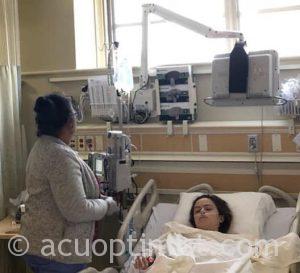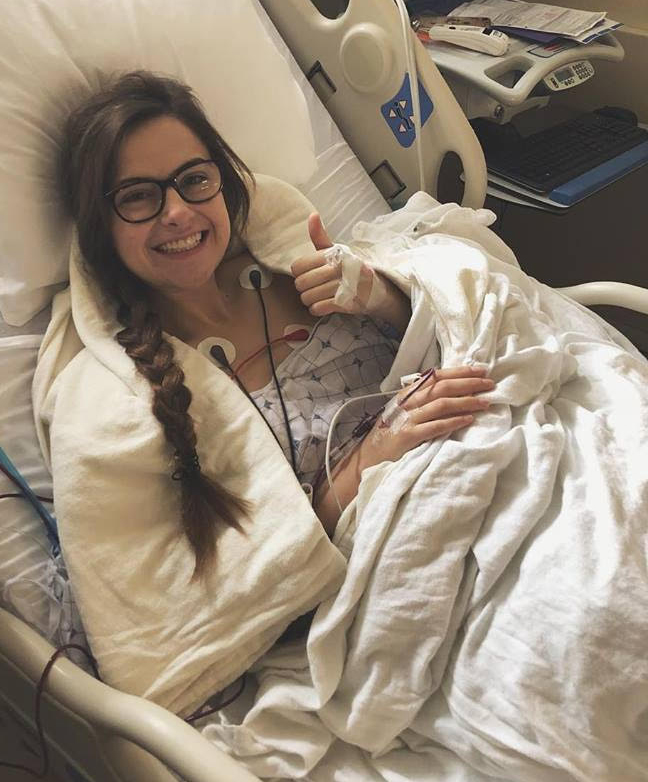In the fall of 2015, Hudson Wade was diagnosed with Leukemia at the age of 11. As his condition progressed, ACU hosted a bone marrow drive with DKMS, a nonprofit group that assists in finding bone marrow donors for stem cell transplantation.
The drive took place in the Campus Center in hopes of finding a match for Wade’s transplant. Several months after the bone marrow drive, Wade lost his long battle.

Losher recovers in Bay 9 (photo courtesy of Madison Losher)
Madison Losher, occupational therapy graduate student from Sunnyvale, was a close friend of Hudson Wade and his family. During his battle with Leukemia, Losher attended the bone marrow drive in hopes that she would be a match. Though she discovered she wasn’t, she moved forward in prayers for the Wade family.
Losher had almost forgotten about the drive when she received a call in July from DKMS informing her that she was a potential match for an infant girl in need of a bone marrow transplant. Throughout August and September, she visited multiple clinics and underwent blood test after blood test.
After what felt like endless testing, Losher finally got the call that she was the top match for the infant one week before the start of classes.
In late September, Losher traveled to Washington D.C. to undergo surgery. Although Losher was under anesthesia for an hour and a half, the surgeon removed marrow from her hip bones in less than 20 minutes.
“It is so simple,” said Losher. “It sounds scary and painful and while you are sore for the week after the procedure, I was back to my normal routine within 3 days of my surgery.”
Losher said Hudson Wade’s family and friends often remember him by the number nine. Nine was his favorite number as well as the number he wore on his back in every sport he participated in. When Losher came out of surgery, she was placed in recovery bay nine.
“The Lord really works in really cool ways,” said Losher. “It was just a small way that we knew Hudson was present that day, as well as the Lord.”
Losher has been recovering for a week and said she is thankful and honored for the opportunity to have donated.
“It may take two weeks of slowing your pace of life after surgery in place of giving life to someone,” said Losher. “I would do it again in a heartbeat.”
Losher said she hopes others will take any opportunity to at least consider donating.
“Being a donor has truly changed my mindset on how I view my body,” said Losher. “The Lord has made it extremely clear to me that my body is not my own, it is his.”
Losher has not had any contact with the recipient or her family. After one year post-operational, the family will be given Losher’s contact information if they choose to contact her.
Throughout her experience and in preparation for surgery, Losher said she was heavily encouraged mentored by Earl Young.
Young is an ACU alumnus, olympic gold medalist, DKMS advocate and bone marrow recipient. He attends the same church as Losher and has connected with her through their similar experiences.
“She took me aside one day and said ‘you’re not supposed to tell anybody, you’re sworn to secrecy. I just wanted to tell you they found a match’,” Young said. “She was so excited.”
Young was in Germany at the time of his transplantation surgery. He said that in Germany, he had to wait two years to get in contact with his donor, but it was an awesome feeling when they finally met.
Young had been emailing his donor after he received the contact information for some time before they met in person. Young was speaking at a conference in Dallas, when he was told that he ran out of time and they wanted him to meet someone. They then introduced him in person to his donor, Christine.
Young said the moment was surreal and emotional and he hopes Losher gets to experience this reunion soon.
“This is what we believers do,” said Young. “It’s a way to help your family and friends, and for many of us it’s the only way to keep us alive.”
Young said the fact that only four of ten people find a match, means there’s a responsibility for donors and survivors to tell their story.
Young said he hopes DKMS continues to thrill young students, as their cells are in the best shape of their lives.
“We get these 18 and 19-year-old excited freshmen coming in,” said Young. “Christine was 43 when she shared her cells, and that’s great, but those cells weren’t as good at 43 as they were at 18. That’s just how the body works. If we can continue to get those young, college-aged students to sign on every year, we’ve got a constant flow to help those in need.”

